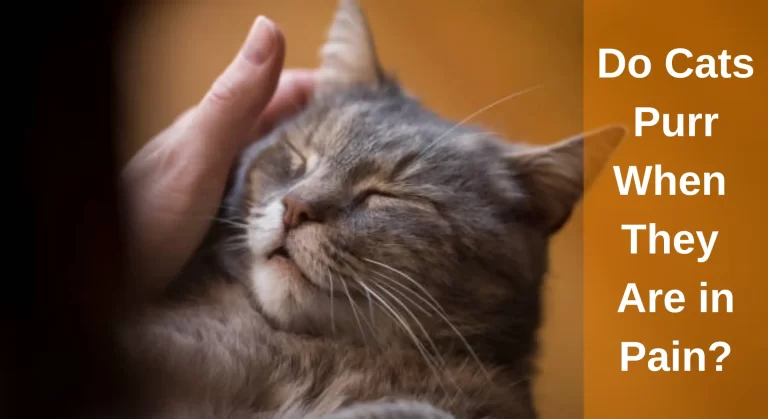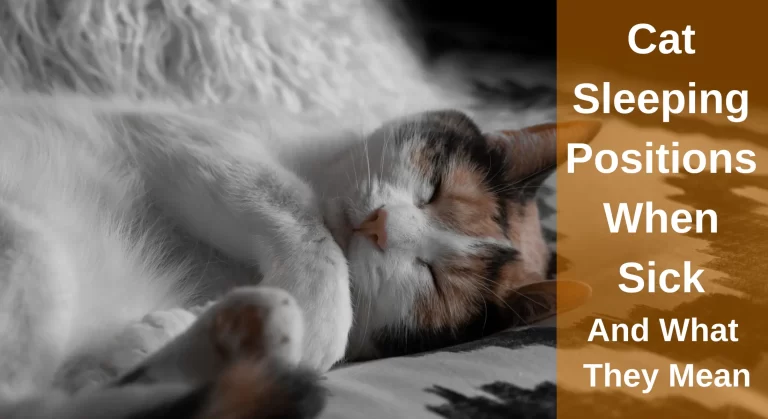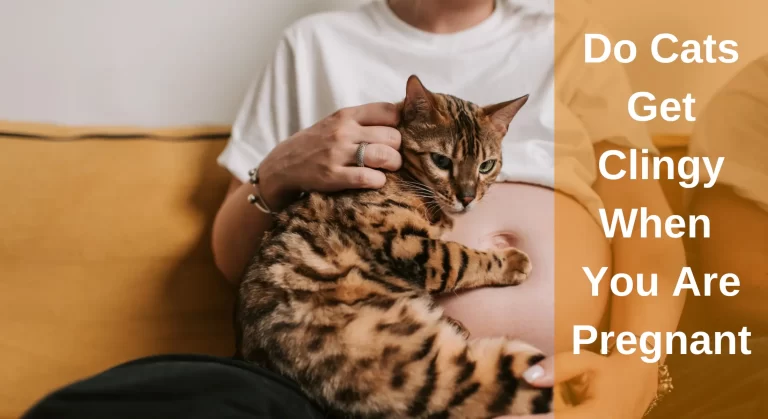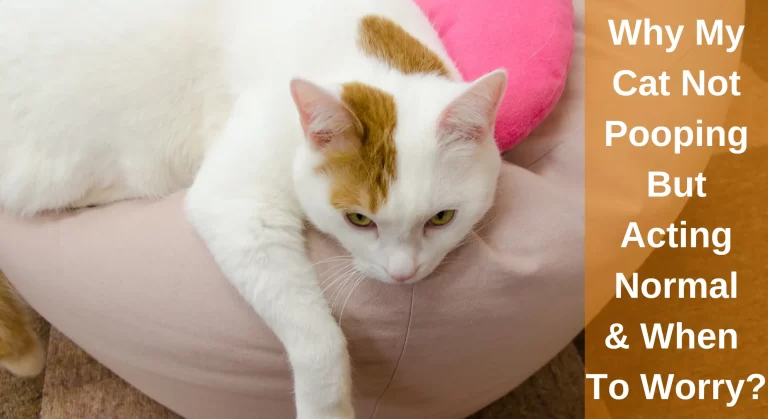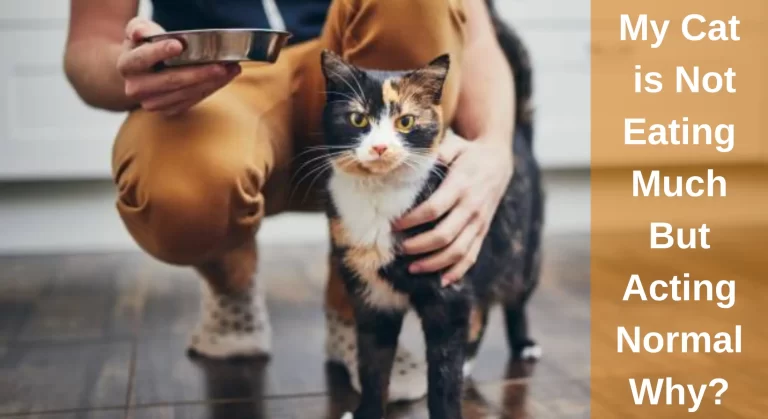Why Does My Cat Lick Me? And How To Respond
Generally, all kinds of cats, whatever age group they may belong to, build a solid attachment to their keepers. Cats are known for their unique ways of showing affection, and one of them is licking. As a cat owner, you may have experienced your furry friend licking you or other objects around the house. But what does it mean when your cat licks you?
There are several reasons why cats lick their owners, including marking their territory, showing affection, seeking attention, relieving stress, and underlying medical issues.
While it may be cute, excessive licking can become bothersome, and it is important to manage it properly. Continue reading to learn how to deal with a cat that licks and the reasons behind their behavior
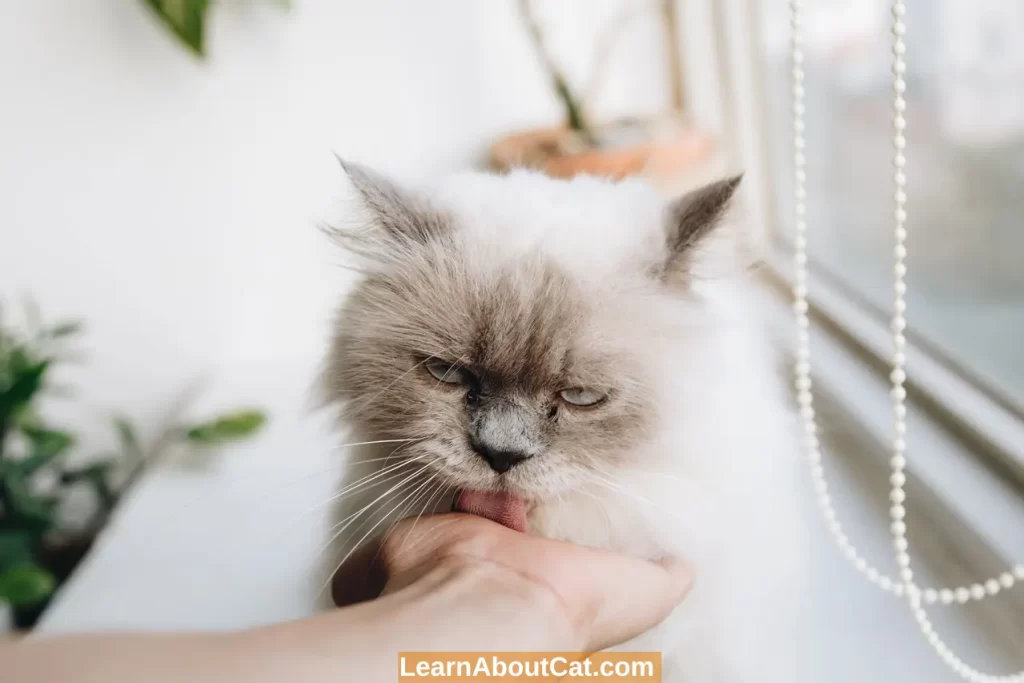
Why Do Cats Lick?
Cats engage in grooming behaviors to maintain cleanliness and bond with other cats. Grooming is also a way for cats to relieve stress and anxiety. Cats lick themselves to clean their fur, but they also lick other cats in their social group to bond and show affection.
The Different Types of Cat Licking
Cats engage in different types of licking behaviors. The most common types of cat licking are:-
- Self-grooming: Cats lick themselves to keep their fur clean and shiny.
- Allogrooming: This is when cats lick other cats in their social group to bond and show affection.
- Licking Objects: Some cats lick objects like plastic bags or blankets to explore and investigate their environment.
- Licking Humans: Cats may also lick their human owners, and this behavior can have different meanings.
Why Do Cats Lick Humans?
If your cat is licking you, it could be a sign of affection, a way to mark you as part of their social group, or a way to communicate their needs. Cats have scent glands on their faces and paws, and when they lick you, they leave their scent on you to mark you as part of their territory.
Check Out: Why Does My Cat Lick Me When I Pet Him?
The Science Behind Cat Licking
Studies have shown that when cats lick, they release endorphins, natural painkillers that promote pleasure and relaxation. A cat may also use licking as a way to comfort himself when he is stressed or anxious.
Why Does My Cat Lick Me? What Does It Mean When Your Cat Licks You?
A cat licking you could indicate a variety of things, depending on the context. Here are some possible meanings of cat licking:

1. Expression Of Love
Cats also use licking as a way to show affection towards their owners. This behavior is often accompanied by purring, kneading, and nuzzling. Licking releases endorphins that create a sense of pleasure and happiness for both the cat and the person being licked.
Predominantly, the licking might be your cat attempting to “kiss” you affectionately. A cat may lick you to demonstrate their trust in you. Licking as a sign of affection indicates that the cat has faith in you and is fully dedicated to you.
2. To get Your Attention
Sometimes, cats lick their owners to get attention. They might start licking you to get your attention if they feel ignored or neglected. If your cat wants to be petted, fed, or picked up, it may lick you to attract your attention.
Also Read: Why Does My Cat Lick My Face?
3. Grooming Behavior – Forms of Social Connection
Licking is natural for cats to keep their hair clean and tangle-free. Cats lick their coats to remove loose fur, dirt, and debris from their coats.
When cats groom themselves, they also spread their natural oils throughout their coat to keep them healthy and shiny.
When a cat licks you, it may be treating you as part of its family or social group, showing you the same grooming behavior it would show to its fellow felines.
4. Territorial Delimitation
Furthermore, cats claim you as their possessions by softly licking and scratching your head. Cats also use licking as a way to show affection towards their owners.
The smell glands in cats’ mouths are used to mark their territory, and they use their saliva to do so. When they lick humans, they are transferring their scent onto us, indicating that we belong to them.
Licking releases endorphins that create a sense of pleasure and happiness for both the cat and the person being licked.
5. Communication
A cat can also communicate by licking. When they lick other cats or their owners, they’re communicating their feelings. Licking can be a sign of submission, trust, and respect. It’s their way of saying, “I trust you” or “I respect you.
6. They Are Highly Stressed
Overlicking can signal anxiety or stress in some people. It could be a sign of allergies or a skin infection if your cat is constantly licking a specific part of its body
Sometimes your cat feels anxious because they are agitated. When cats and other animals are agitated, it might occasionally indicate that they’re unhappy; they frequently begin licking objects excessively.
This can involve licking you; if you suspect this, see your local veterinarian. If you believe your cat is worried, attempt to pinpoint the source of their anxiety to know if you can eliminate it.
7. They Take Pleasure In Your Taste
Cats may lick your skin or hair to investigate interesting smells or scents, such as a lotion, shampoo, or other topical product that is appealing to them.
Our perspiration includes sugar and salt, which cats like licking. Salty skin, sprays, perfumes, and moisturizers may all be appealing to your cat, as bizarre as it may sound.
8. Medical and Other Reasons
If your cat is suffering from a health problem, it may lick you or objects in the environment. It is possible for cats to lick excessively due to certain medical conditions, including allergies, skin infections, inflammatory bowel disease, nausea, discomfort, and pain.
Skin dryness and itching are often due to nutritional deficiencies, particularly fatty acid and mineral deficiencies, which lead to excessive licking.
If you notice that your cat is licking you more than usual, it’s essential to consult a veterinarian to rule out any underlying health issues.
How to Respond to Your Cat’s Licking
As a cat owner, it’s important to respond appropriately to your cat’s licking behavior to maintain a healthy and happy relationship with your pet.
If your cat is licking you, there is no need to worry. Here are some tips for responding to your cat’s licking:
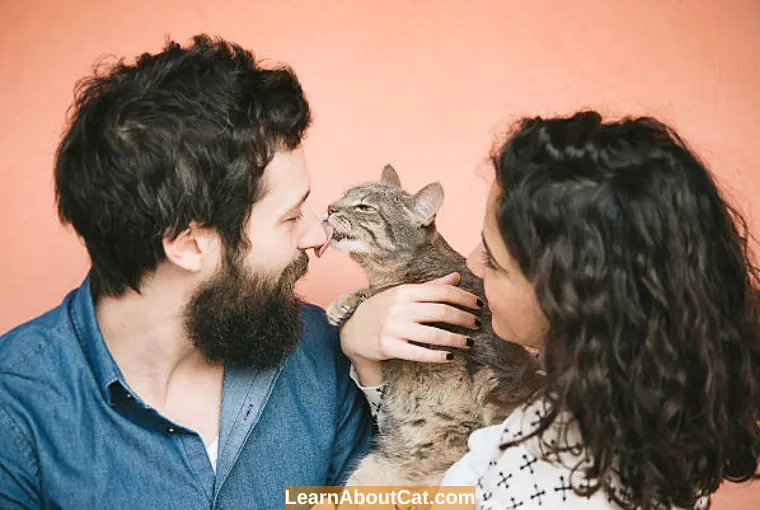
- Enjoy the Affection: If your cat is licking you as a sign of affection, enjoy the moment and return the affection if you wish. It’s a sign that they trust and love you, and it can strengthen the bond between you and your cat.
- Redirect the Behavior: If your cat’s licking becomes too much, you can redirect their attention to a toy, engaging them in playtime or treat. This will help them shift their focus and provide positive reinforcement for good behavior.
- Practice Good Hygiene: While cat saliva is not harmful, it is important to practice good hygiene, especially if you have any open wounds or cuts. Make sure that the affected area is cleaned with soap and water.
- Monitor for Health Issues: A cat’s excessive licking, in conjunction with other unusual behaviors, such as hair loss or skin irritation, might indicate an underlying health problem. Make sure you speak to your veterinarian if you suspect any health issues.
Tips for maintaining good hygiene
Maintaining good hygiene is essential for both your and your cat’s health. Here are some tips to help you keep your furry friend clean and healthy:
- Regular grooming – Regular grooming, including brushing and bathing, can help keep your cat’s fur clean and reduce the need for excessive licking. Brushing helps remove loose fur and prevents hairballs, while bathing can help remove dirt and oil from your cat’s skin and coat.
- Washing hands – Washing your hands after your cat licks can help prevent the spread of bacteria and germs. Cats have bacteria in their mouths, and while it’s generally harmless, it’s still important to wash your hands to prevent any potential infections.
- Avoiding harsh chemicals – Whenever you clean your home, be careful not to use harsh chemicals that might harm your cat. Cats can be sensitive to certain cleaning products, so look for pet-safe alternatives or use natural cleaning solutions like vinegar or baking soda.
- Regular check-ups – Regular visits to the vet can help ensure that your cat is healthy and free from any medical conditions that could cause excessive licking or other grooming behaviors. Additionally, your veterinarian can provide advice on grooming your cat based on its specific needs.
By following these tips, you can help maintain good hygiene for your cat and yourself while also promoting a healthy and happy relationship with your furry friend.
Is It Okay If Your Cat Licks Your Face?
The general consensus is that accepting your cat’s lick is safe, but you need to consider a few factors.
When a cat licks an open wound, germs in its mouth might cause a local or systemic infection. Those with weakened immune systems are more prone to get infected.
Although acquiring an infection from your cat is highly improbable, don’t let your cat licks an open wound on your skin to be safe.
Also, a few pharmaceutical creams may be harmful to your cat if licked. If you use anything on your skin or hair, check with your veterinarian to determine if it’s safe for your cat.
Also Check Out: Should I let My Cat Lick Its Wound?
Why Does It Occasionally Hurt When A Cat Licks You?
You may find it aggravating when a cat licks you, especially if it happens frequently. This is due to the ‘papillae,’ which are back-facing barbs on your cat’s tongue.
Because these barbs are constructed of the same substance as your cat’s claws, a sandpaper-like feeling comes out from their tongue.
But these barbs are essential for your cat’s grooming. By eliminating dirt and debris from a cat’s coat, the barbs help keep it clean. Sharpening barbs is necessary as it helps pick up dirty substances from their mouth or tongue. In this way, these act as sweepers for them.
How To Get Rid Of Your Cat Licking?
You may find your cat’s licking unpleasant or even irritating, depending on its cause. Scolding, squirting water, spraying with bitter-tasting spray, or shaking a jar of money are all examples of punishment. This may jeopardise your relationship with your cat and make it more agitated, exacerbating your cat’s licking.
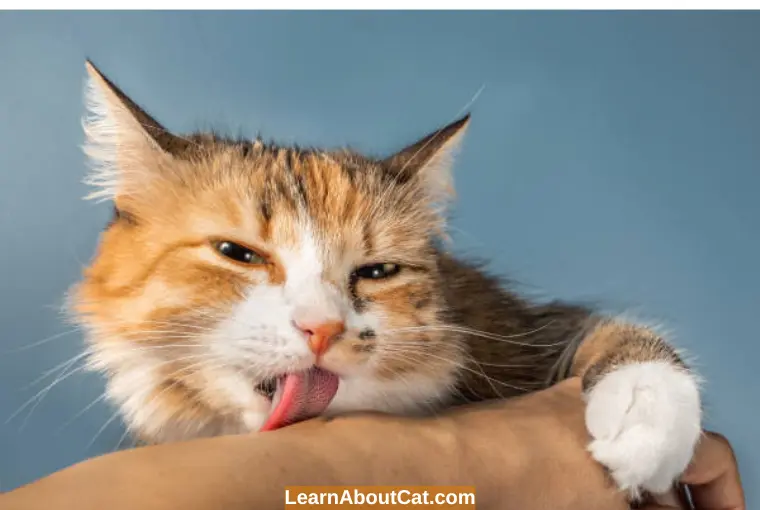
Here are some suggestions for reducing licking
- When you engage with them, wear long-sleeved clothes or a tiny towel to protect your skin, and give them a food puzzle or toy.
- Provide alternative options – You can also provide your cat with alternative options for grooming and showing affection, such as brushing or petting. This will give them other ways to express their love and maintain good hygiene.
- Get out of there as soon as your cat begins licking you. If your cat is licking for attention, ignore it, and the problem will disappear. Don’t entirely ignore your cat; only ignore them when they lick you.
- Buy a variety of toys, hide all except 5-6, and change them every few days to keep things fresh. Provide your cat with vertical spaces like cat trees, perches, and other hiding spots.
- Spend at least 15 minutes socializing with him three times a day.
- If the licking continues after a week, there is undoubtedly another reason that must be addressed, and you should seek advice from your veterinarian.
Frequently Asked Questions
Why do some cats lick more than others?
While all cats lick, some cats may lick more than others. This is because of their personality, breed, or health. Some breeds, such as Siamese and Persian, are known to be more affectionate and may lick their owners more.
Excessive licking may indicate an underlying health issue, such as an anxiety disorder or skin condition.
Is it normal for cats to lick their owners?
Yes, it is normal for cats to lick their owners to express affection and bond with them.
How do I know if my cat’s licking is excessive?
If your cat is licking a specific area excessively, such as a spot on their fur or your skin, it may be a sign of excessive licking behavior.
Can I train my cat to stop excessive licking?
Yes, behavior modification techniques, such as positive reinforcement training, can be helpful in reducing excessive licking behavior. Getting help from a professional behaviorist can also be beneficial.
Why do cats lick plastic bags or blankets?
Cats may lick objects, such as plastic bags or blankets, to explore and investigate their environment.
Should I be concerned if my cat licks me too much?
While it is generally not harmful to cats to lick their owners, excessive licking may be a sign of an underlying health issue. Monitor your cat’s behavior and consult with your veterinarian if
Final Thoughts!
Cats are unique animals with complex behavior. Using their licks to express affection and trust is an instinctive behavior for cats. When trying to figure out your cat’s behavior, you must understand its body language and behavior.
Understanding the reason behind your cat’s licking behavior is essential to strengthening your bond and avoiding any negative behavior. Remember to respond appropriately to your cat’s affection and set boundaries if necessary.
Related Posts:
- Why Does My Cat Bite My Hair And Head?
- Why Does My Cat Purrs And Bites Me Gently?
- Cat Licks My Food Can I Eat It?
- Why Does My Cat Bite Me?
- Can Cats Be Obsessed With Their Owners?
- Do Cats Get More Affectionate With Age?
- Why Is My Cat Licking My Other Cats Bum?
- Why Is My Cat So Affectionate All of a Sudden?
Who is Isabella?
My name is Isabella, and I am a dedicated and knowledgeable cat enthusiast. With years of experience caring for cats and a deep love for felines, I made a mission to help other cat lovers navigate the challenges of cat ownership.

